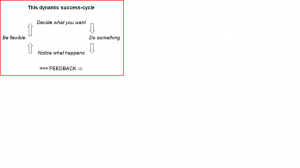Achieving outcomes is the bottom line of business activity.
It starts with a dream, but that has to become a plan which is followed through. Logically you might think achieving your outcomes should be as simple as setting goals, but life isn’t logical. Life is fully of cycles and ebbs and flows. So how do you make sure you are doing the right activities for achieving your outcomes?
There is a cycle that will move you forward and become increasingly expert, so that you achieve your desired outcomes quicker and more often.
1. Decide what you want
Without a goal or outcome, any behavior is likely to be futile. It can only be successful against a yardstick.
We are designed with an inbuilt tendency to be goal-orientated, though this often operates unconsciously or unclearly.
The first step is to decide what it is you want. You can consciously use your inbuilt goal-orientated tendency to follow a purpose or intention.
2. Do something
Real results depend on action. This is where dreamers and wishers differ from real achievers.
The action you choose will be whatever you consider is best to achieve your outcome; therefore the better you define your target, the more chance you have of acting effectively.
Initially, your behavior might fail to produce the outcome – like a missile’s first experimental launch – but it will give you a general direction for feedback.
Your actions and ideas will become ‘honed’ with practice (you might be tempted to call them mistakes), which are the very important feedback that your eventual success depends on.
Doing something is part of the essential process of learning. It could be making your first phone call to your prospective client. Top achievers are decisive and willing to act in situations when others are talking and planning.
Never set a goal without also taking the first action to bring it about.
3. Notice what happens
Noticing what happens provides the necessary feedback that establishes how far off target or on target we are so that we can adjust.
We need to pay attention and literally use our senses – seeing, hearing and feeling – the result of any behaviour. The better our observations, the better we will be able to decide upon a different behavior that takes us nearer our goal.
Personal excellence is mainly to do with being confident of and effectively using our extraordinary sensory powers.
4. Be flexible
Be prepared to change what you are doing, in response to what you notice, again with an eye on the outcome. It doesn’t serve success to become too attached to your ideas. Being flexible is being creative.
“If at first you don’t succeed, try something different” – anything other than the behavior which guarantees you’ll miss your goal.
“If you always do what you’ve always done, you’ll always get what you’ve always got. If what you are doing is not working, do something different.”
When doing this reflecting, think as if you are the customer; something different doesn’t have to be sensational.
Being flexible involves personal risk-taking. Familiar activity may feel safe but if it is not giving you the feedback of desired results it is high risk. Generally fear of failure or fear of rejection restricts action, and it particularly applies when we are at the point of moving out of our zone of familiarity and comfort.
Finally…
Challenge yourself at every stage of this cycle with: “Do I do that?” Then check your self-truth with: “So in what ways and when am I doing that?”. Also ask yourself the vital question: “When am I not doing that?” Results and new skills lie before you; it is simply a matter of learning.

